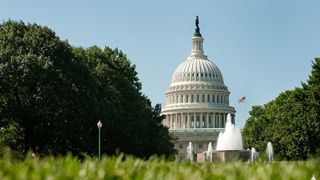Bipartisan Senate Duo Say Net Neutrality Decision Must Prompt Hill Action

Congress is on a two-week hiatus for district work days, but that did not stop legislators from weighing in on the federal court decision upholding the FCC's decision to deregulate internet access, including the bipartisan duo heading up a working group looking to fashion compromise net neutrality legislation.
Senate Commerce Committee chairman Roger Wicker (R-Miss.) and Sen. Kyrsten Sinema (D-Ariz.), who together lead that working group, put out a joint statement that avoided taking sides on the decision, instead talking about finding some path forward.
“Today’s ruling makes clear that Title II regulations are not required for maintaining an open internet," said Wicker. "It is incumbent on Congress to pass federal net neutrality standards that will protect consumers, promote broader access to the internet, and ensure internet providers treat content from all sources fairly. We need straightforward guidelines that will not change based on who occupies the White House. I look forward to continuing to work toward these goals with Senator Sinema as we seek to find common ground on this important issue.”
"Net neutrality is critical to maintaining a vibrant internet. We need a modern, internet-specific framework that encourages the freedom and innovation that make the internet the vital tool it is today,” said Sinema. “Today's court decision makes clear Congress must pass a bipartisan, comprehensive net neutrality solution that offers certainty to consumers and providers."
Another joint statement, this one from two Democrats on the House side, also were calling for legislation, but the House-passed Save the Internet Act that would restore the rules under Title II, a nonstarter for most Republicans.
Related: CBO Scores Net Neutrality Bill Cost as Negligible
“The Trump Administration’s decision to abandon net neutrality continues to harm consumers and small businesses, leaving a few large corporations in control of an essential component of modern life," said House Energy & Commerce Committee Chairman Frank Pallone (D-N.J.) and Communications Subcommittee Chairman Mike Doyle (D-Pa.). "In April, the House passed the Save the Internet Act to restore basic consumer protections online and preserve a free and open internet. This decision reiterates that the Senate needs to act quickly to pass that legislation to put Americans, not corporations, first.”
Broadcasting & Cable Newsletter
The smarter way to stay on top of broadcasting and cable industry. Sign up below
The Congressional Budget Office has provided a succinct description of what the Save the Internet Act would do:
"H.R. 1644 would require the Federal Communications Commission (FCC) to return to the regulatory framework for internet service providers (ISPs) that was in effect as of Jan. 19, 2017. The bill would effectively shift the oversight of ISPs from the Federal Trade Commission (FTC) and the Department of Justice (DOJ) to the FCC by re-designating mobile and fixed-broadband internet access services as telecommunications services subject to common-carrier laws under title II of the Communications Act of 1934. Thus, the FCC could take enforcement action regarding any unjust, unreasonable, or discriminatory ISP practices.
"H.R. 1644 would repeal the Restoring Internet Freedom Order (FCC 17-166) adopted by the FCC on Dec. 14, 2017, and prohibit its re-issuance in substantially the same form. The bill would restore the Open Internet Order (FCC 15-24) adopted by the FCC on Feb. 26, 2015, and any subsequent regulations in effect on Jan. 19, 2017."
Contributing editor John Eggerton has been an editor and/or writer on media regulation, legislation and policy for over four decades, including covering the FCC, FTC, Congress, the major media trade associations, and the federal courts. In addition to Multichannel News and Broadcasting + Cable, his work has appeared in Radio World, TV Technology, TV Fax, This Week in Consumer Electronics, Variety and the Encyclopedia Britannica.

